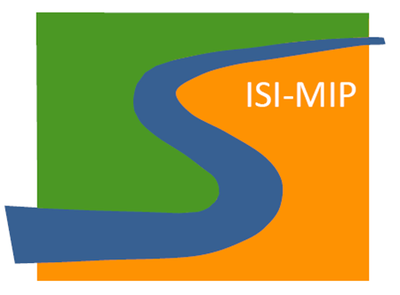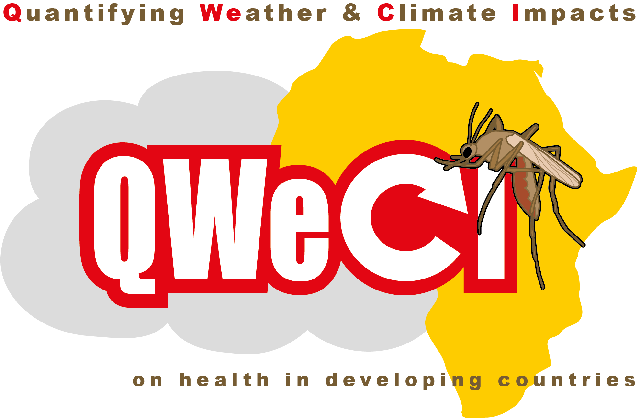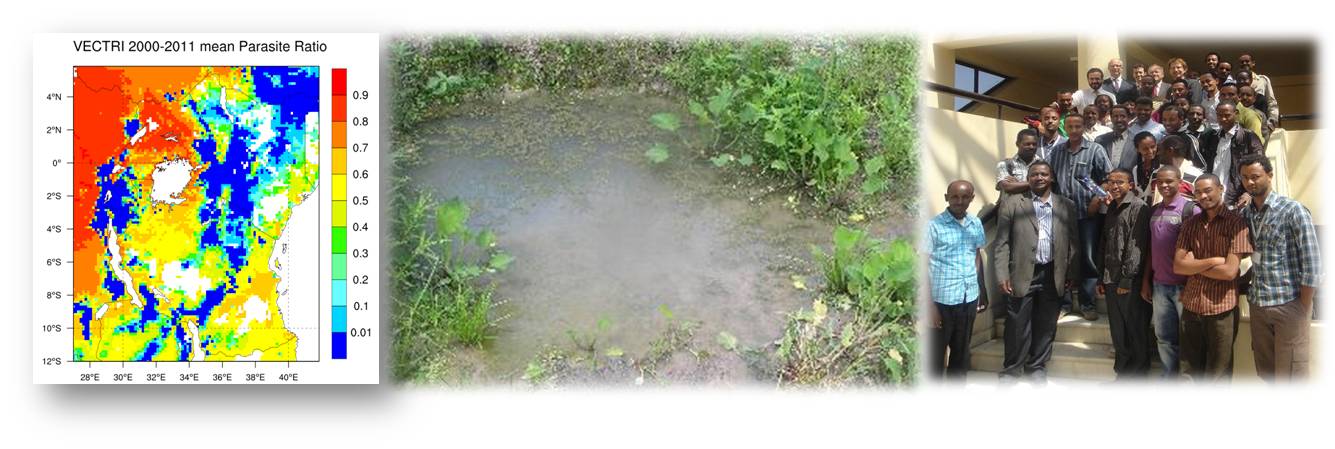Malaria Machine Learnign for interventions
 ECMWF
A project in collaboration with IAEA running 2021-2023, we are
applyign machine learning algorithms to calculate the most
cost effective way of implementating the sterale insect
technique releases that also account for seasonality and
interannual climate variability. A new parameterization for
SIT has been inserted in 2022 and the machine learning
algorithms are currently under investigation.
ECMWF
A project in collaboration with IAEA running 2021-2023, we are
applyign machine learning algorithms to calculate the most
cost effective way of implementating the sterale insect
technique releases that also account for seasonality and
interannual climate variability. A new parameterization for
SIT has been inserted in 2022 and the machine learning
algorithms are currently under investigation.
Malaria Early Warning System
 ECMWF
monthly and seasonal forecasts are being used
to drive VECTRI to create a first
prototype pan-Africa operational forecasting
system for malaria. The system has been
validated with colleagues from the ministries of health in
Malawi, Uganda and Rwanda. The pilot forecast system runs for
the whole of the African continent. Please contact the authors
if you are interested in receiving hindcast data as part of this
validation exercise.
ECMWF
monthly and seasonal forecasts are being used
to drive VECTRI to create a first
prototype pan-Africa operational forecasting
system for malaria. The system has been
validated with colleagues from the ministries of health in
Malawi, Uganda and Rwanda. The pilot forecast system runs for
the whole of the African continent. Please contact the authors
if you are interested in receiving hindcast data as part of this
validation exercise.
ISIMIP
 ISIMIP is a malaria
model intercomparison project which contributes to the
impacts section of the next IPCC 5th
assessment report. VECTRI is presently the
only dynamical model contributing to the project that runs on
a daily timestep and thus accounts for subseasonal variations
in climate
ISIMIP is a malaria
model intercomparison project which contributes to the
impacts section of the next IPCC 5th
assessment report. VECTRI is presently the
only dynamical model contributing to the project that runs on
a daily timestep and thus accounts for subseasonal variations
in climate
HEALTHYFUTURES
 Healthy Futures is an EUFP7 project running from
2011-2014. Its focus is on the impact of environment,
including climate change, on malaria transmission in Eastern
Africa. Led by Prof. David Taylor of TCD in Dublin (now at
Singapore national university) the project is supported by
institutes throughout Europe and Eastern Africa. According to
the HF website:
@quot the project aims to construct a disease risk mapping
system for three water-related, high-impact VBDs (malaria,
Rift Valley fever and schistosomiasis) in eastern Africa,
taking into account environmental/climatic trends and changes
in socio-economic conditions to predict future risk @quot
Healthy Futures is an EUFP7 project running from
2011-2014. Its focus is on the impact of environment,
including climate change, on malaria transmission in Eastern
Africa. Led by Prof. David Taylor of TCD in Dublin (now at
Singapore national university) the project is supported by
institutes throughout Europe and Eastern Africa. According to
the HF website:
@quot the project aims to construct a disease risk mapping
system for three water-related, high-impact VBDs (malaria,
Rift Valley fever and schistosomiasis) in eastern Africa,
taking into account environmental/climatic trends and changes
in socio-economic conditions to predict future risk @quot
QWeCI
 Quantifying weather and climate impacts on
health in developing countries (QWeCI) is a project led by
Dr. Andy Morse of the University of Liverpool and which was
co-designed by Adrian Tompkins here at ICTP. While the
project also examines the variation of malaria transmission
over longer timescales, the main focus is on the
predictability of malaria on monthly to seasonal timescales.
The project has equal number of partners in Europe and Africa,
and initiated the collaboration that has led to the ECMWF-VECTRI
pilot forecasting system that is currently under evaluation.
Quantifying weather and climate impacts on
health in developing countries (QWeCI) is a project led by
Dr. Andy Morse of the University of Liverpool and which was
co-designed by Adrian Tompkins here at ICTP. While the
project also examines the variation of malaria transmission
over longer timescales, the main focus is on the
predictability of malaria on monthly to seasonal timescales.
The project has equal number of partners in Europe and Africa,
and initiated the collaboration that has led to the ECMWF-VECTRI
pilot forecasting system that is currently under evaluation.
Links
The VECTRI authors would also like to ackowledge the following resources/projects, which have been used in the VECTRI model or for its evaluation.
MAP : Gridded assessment of PR and EIR values using a Bayesian model to incorporate survey data.
Afripop : high resolution population density data for Africa.
GRUMP: global population data on a high spatial resolution.
NEWS
v1.11.branch
We have new parameterizations for (1) Bednets, (2) Aedes albopictus (3) Aedes agypti. These are currently still in branches as they need further evaluation before release but if you are interested to use them, please contact us. v1.11.4
New documentation pages released (incomplete)
v1.11.1
Sterile Insect Technique implemented.
v1.9
v1.10
Urban breading site fraction introduced.
Aedes vectors introduced
v1.11.1
Sterile Insect Technique implemented.
Ability to read in externally generated pond fraction from a full hydrological modelling scheme New map of permanent breeding sites using pond edge fraction derived from Sentinal 2 data (20m/150m resolution Africa/global, aggregated to 5km) Correction and relaunch of the revised Asare pond scheme which allows for non-linear runoff and overflow and is validated against in situ observations and high resolution modelling in Ghana and Niger (see Asare et al. 2016a/b) Maps of soil texture used to allow spatially varying infiltration rates according to clay/silt/sand proportions New -v command line option to pass modified paramters to code (avoiding the need to place options in the vectri.options file).
v1.8.0/1.8.1
Jan 2020: Diffusion of vectors between gridcells added.
May 2019, Version 1.7.0 has now been released (May 2019) which introduces a massively simplified interface to make it much easier to run the code with gridded data. The model no longer accepts text file input, only netcdf input is possible (a grib interface is currently under testing). A new (and slowly improving) manual is also available.
Did you know?
VECTRI is now coupled to seamless monthly-to-seasonal forecasts from ECMWF to create a pilot pan-Africa operational forecasting system for malaria.
read more>>
VECTRI downloads:
